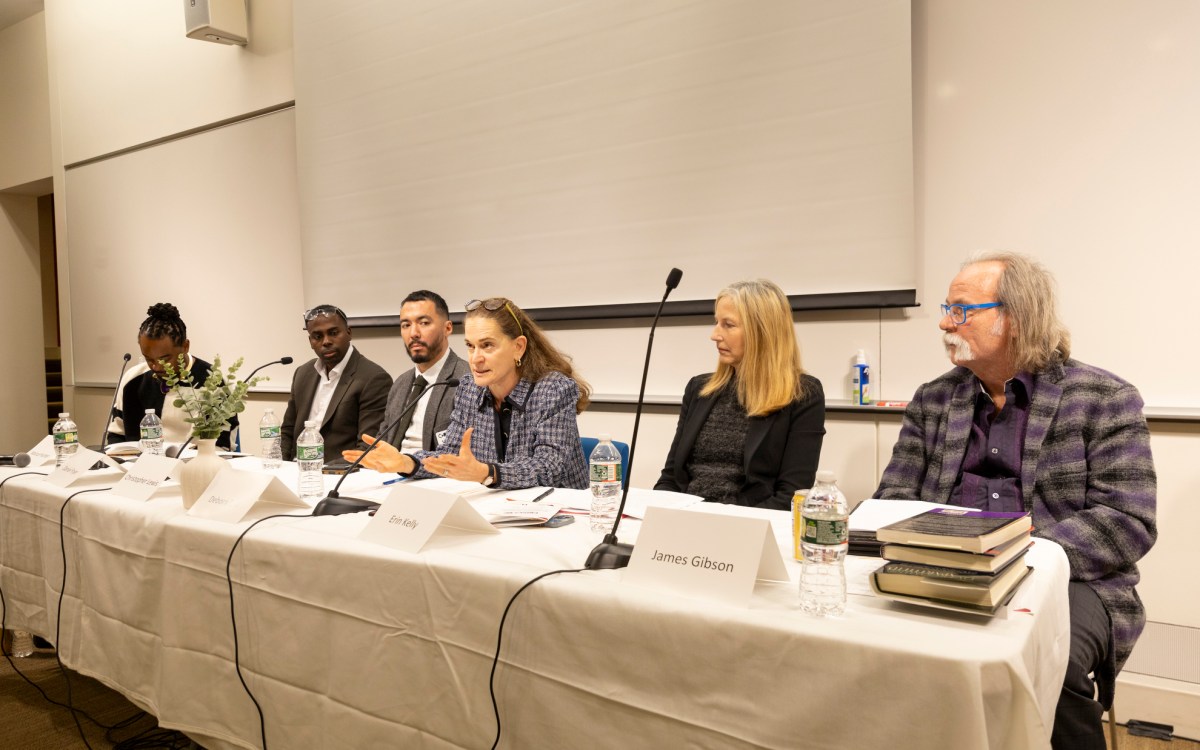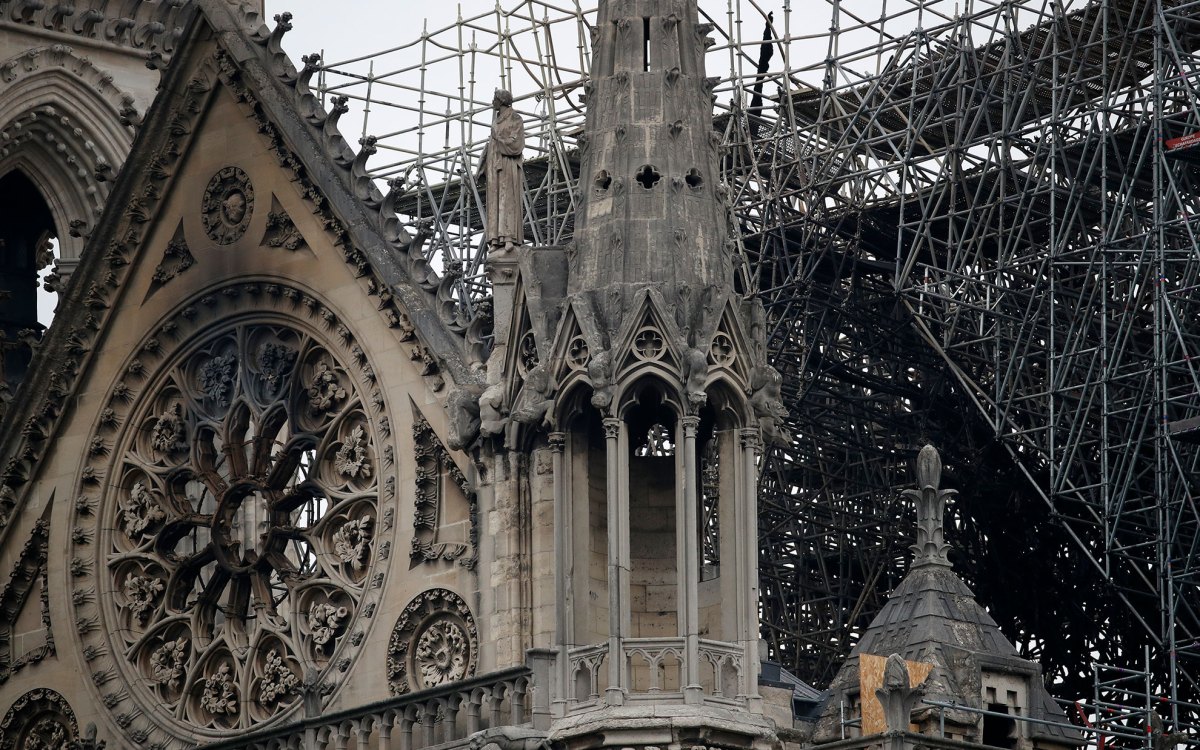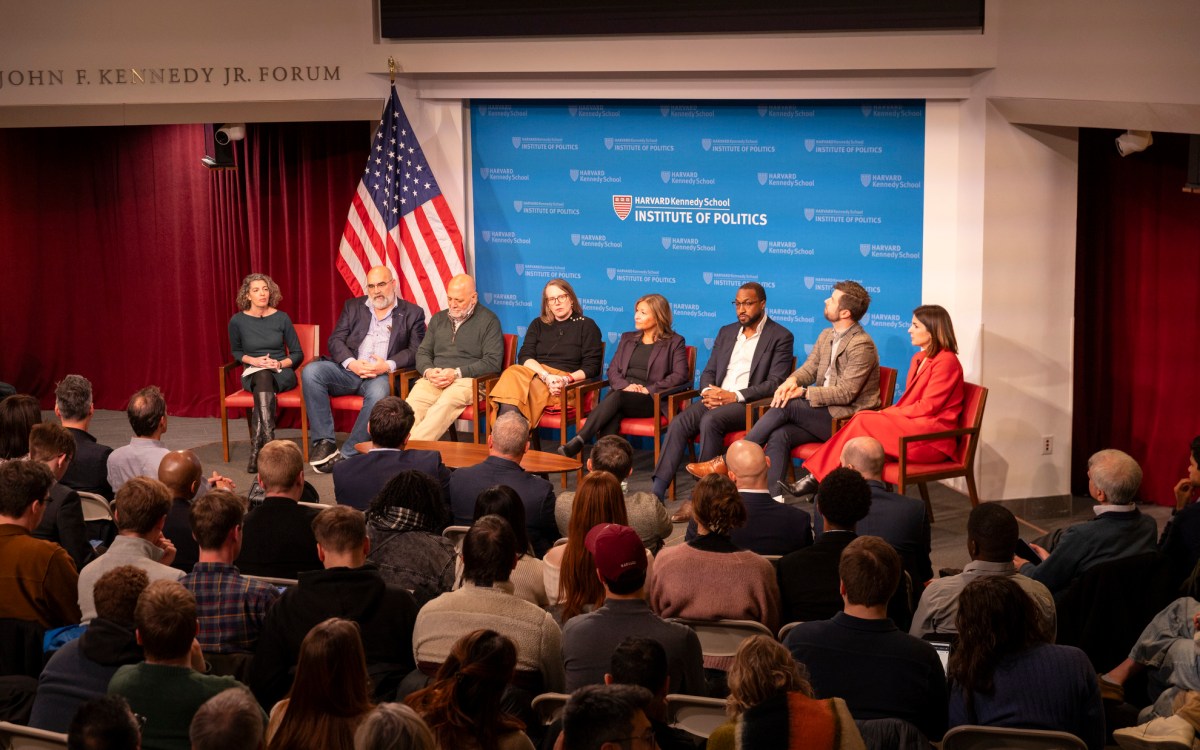Nation & World
-

Unfuzzy math: U.S. needs to do better
Ed School expert has some ideas, including a rethink of homework bans, after ‘discouraging’ results

-

What to expect when you’re elected
Bipartisan group of lawmakers gets to know Washington by way of the IOP
-

Defining and confronting campus antisemitism
Scholars in Jewish Studies say education, conversation can bolster efforts to defeat hate
-

Are reparations the answer?
Harvard symposium explores case for restitution to Black Americans legally, economically, ethically
-

Exact cause of Notre-Dame fire still unclear. But disaster perhaps could’ve been avoided.
Leadership expert says foreseeable factors all contributed to complex failure. Consistent focus needed on best practices, rules, procedures.

-

How the presidency was won, lost
Top campaign leaders from both sides talk about what worked, didn’t at Kennedy School postmortem
-
‘To whom much is given …’
Melinda Gates is likely the happiest woman alive. That is, if a recent study, co-conducted by a Harvard Business School (HBS) scholar, is any indication — it shows that people who spend money on others are happier than those who spend it on themselves.
-
Hospital brings hope to Haiti
A hospital opened in January where a year earlier cows grazed. There were banners and bands that bright day in the tiny community of Lacolline, Haiti.
-
From Law School to Business School — evolution of the case method
On a recent Wednesday morning, 90 high achievers from around the world prepared to get down to cases. Their professor buzzed through the classroom like a worker bee. Armed with large, multicolored pieces of chalk, he organized his notes, copied pastel-coded facts and figures on the blackboard, and set up a film screen. Soon his students would be equally hard at work, but in a strictly cerebral way.
-
Web of care
Lake Peligre fills the valley floor, its dark blue waters a relief to the eye after hours winding through central Haiti’s hot, treeless hills on the dusty, potholed road that passes for National Route 3.
-
Public interest lawyers come home to HLS
Last weekend (March 13-15), current and future lawyers at Harvard Law School (HLS) discussed how to change the world. The first “Celebration of Public Interest” at HLS brought together hundreds of the School’s alumni involved in public service careers to discuss their work, share their stories, and engage with the next generation of lawyers considering public interest professions. More than 700 people attended the event.
-
‘Baby College’ and beyond
Geoffrey Canada — author, educator, psychologist, motivator, poet, black belt, sometime comedian, and founder of the Harlem Children’s Zone — spoke to an enthusiastic crowd of about 300 in the packed Ames Courtroom in Austin Hall last week (March 12).
-
The Holy Land comes to Florida as a theme park
Little did a Harvard scholar who studies sacred spaces imagine that she would find the Holy Land in Florida. Several years ago, while chatting with her niece, a resident of the Sunshine State, Joan Branham, visiting associate professor of women’s studies and early Christianity and Judaism and acting director of the Women’s Studies in Religion Program at Harvard Divinity School (HDS), learned about Florida’s newest theme park, one with a divine foundation.
-
Wisse explores mutations of Jewish power
If the Jewish rebellion led to a diaspora that lasted millennia, it also prompted a sea change in the nature of Judaism, said Ruth R. Wisse, Harvard College Professor and Martin Peretz Professor of Yiddish Literature. An energetic commentator on Jewish culture, Wisse delivered a Humanities Center lecture this week (March 17) summarizing her new book, “Jews and Power” (Nextbook/Schoken, 2007).
-
Haiti: Maternal mortality
A serious lack of healthcare infrastructure and an absence of reliable transportation leave Haitian women with few places to safely give birth.
-
Haiti: Dr. Louise, a higher purpose
An assistant professor at Harvard Medical School and infectious disease specialist at Harvard-affiliated Brigham and Women’s Hospital, Louise Ivers works through the nonprofit organization Partners In Health.
-
Haiti: Malnutrition
In Haiti, malnutrition is the most serious threat to pediatric health.
-
Where the intellectual and spiritual intersect
Kevin Madigan wishes he could have saved Anne Frank. Today, he repeatedly saves her memory. Madigan, professor of the history of Christianity at Harvard Divinity School (HDS), teaches the College freshman seminar “The Holocaust, History and Reaction,” which addresses the Jewish genocide through the study of a variety of texts, literature, and film. The course offers students a historical perspective on the Holocaust, and examines religious and theological reactions to the tragedy.
-
Can corporations police themselves effectively?
On the surface, one might argue, it looks like the business world is headed in a decidedly socially conscious direction. Coffee giant Starbucks supports fair prices for its coffee growers. Wal-Mart, the department store dynasty, has instituted a number of measures to lighten its environmental footprint. Companies everywhere tout their eco-friendly products and packaging, and public awareness and support for such trends continue to grow.
-
Provost’s Fund for technology seeks proposals
The Office of the Provost makes funds available to faculty for University projects that promise to alter and improve teaching and learning through the use of technology. The Provost’s Instructional Technology Fund is made up of two funds: the Innovation Fund and the Content Fund. The Innovation Fund is for large-scale projects that propose to introduce a novel approach to teaching and learning using information technology. The Content Fund is aimed toward creating online content for educational purposes.
-
Panel assesses the ‘power of unreasonable people’
There’s a desire for change, especially among the young, “a spirit sweeping across this country and indeed across the world,” said David Gergen, professor of public service at Harvard’s John F. Kennedy School of Government (HKS) and director of its Center for Public Leadership. Gergen’s remarks at the John F. Kennedy Jr. Forum opened a panel discussion Monday (March 3) on social entrepreneurship and the power of what he called “unreasonable people.”
-
Consumers want to do the right thing
A majority of consumers want to do the right thing. That is, in numerous studies, consumers say that they are willing to pay more for products produced under good working conditions, rather than those that come from sweatshops. But what consumers say and what they actually do when they pull out their wallets at the cash register is not as clear.
-
‘Dirty Work’
As reports of the subprime mortgage meltdown continue, an exhibition on view through March 16 in Gund Hall Gallery highlights a real estate crisis of an altogether different sort. A third of the world’s city dwellers — 1 billion people — live in shantytowns.
-
Victor Cha looks at Olympic politics
Victor Cha, director of Asian affairs on the National Security Council from 2004 to 2007 and a former Olin National Security Fellow at Harvard, returned to campus last week (Feb. 14) to talk about the surprisingly forceful “soft power” of sport in the realm of international relations and diplomacy.
-
Calderón cites nation’s progress
The election that put Felipe Calderón Hinojosa into office as the president of Mexico was a real squeaker — the closest vote in the modern history of his country. It took a couple of months for the federal electoral tribunal to certify him as the winner. Even then his chief opponent wouldn’t concede. An hour before Calderón’s swearing in, leftist opposition lawmakers were throwing punches and even chairs in the legislative chamber, in an attempt to block his inauguration. The whole brawl was carried live on television across Mexico. But that was then. This is now.
-
Security chief cautions against complacency
If Michael Chertoff, secretary of the U.S. Department of Homeland Security, was politically wounded by his department’s response to Hurricane Katrina, he showed no sign of it during his forceful lecture Feb. 6 at the Kennedy School of Government.
-
Brazilian Studies welcomes ambassador
The Brazilian ambassador to the United States, Antonio Patriota, will visit Harvard on Feb. 13 to participate in the University’s new and dynamic Brazil Studies Program’s spring 2008 calendar of events. The ambassador will speak about relations between Brazil and the United States and the new role of Brazil in the global economy and in Latin America, as well as the foreign policy of President Luiz Inácio Lula da Silva. Patriota will visit the Center for Government and International Studies (1730 Cambridge St., Room S050) from 12:30 to 2 p.m.
-
KSG launches new program in Greece
A new Harvard program intended to address the needs of nongovernmental organization (NGO) leaders will debut in Greece March 25 through 29 at the Athens Information Technology institute (AIT). The “Strategic Management for Leaders of Non-Governmental Organizations” executive education program is designed for NGO leaders in Southeastern and Eastern Europe, the Eastern Mediterranean, and the Middle East who are committed to improving the performance of their organizations.
-
New exhibit traces women in business at Harvard
In its earliest years, the opening of business courses to women was dubbed a “daring experiment” by one Harvard faculty member. It turned out to be a successful experiment as well, one that slowly evolved into the mainstream at Harvard Business School (HBS).
-
‘Power session’ for women held at the Business School
“You guys are going to rule the world, mark my words,” Janet Hanson told a captivated audience in the Harvard Business School’s Burden Auditorium. “I’m so bullish on your generation, it’s not funny.”
-
War and changing concepts of masculinity
The Vietnam War cost the United States just over 58,000 dead — less than 5 percent of the 1.4 million Vietnamese, French, and other military personnel killed in Indochina combat going back to 1950.
-
Royal talks politics with students
On the eve of Super Tuesday, Harvard students gathered to discuss politics — French politics, that is — with the first woman in French history to run as a major presidential candidate.
-
‘A good start’
Late in January, a delegation from Chile visited Harvard to discuss “Un Buen Comienzo” (“A Good Start”), an early childhood education program undertaken in 2006 by the Harvard Graduate School of Education (HGSE), Harvard Medical School (HMS), and the David Rockefeller Center for Latin American Studies (DRCLAS), with the Chilean Ministries of Education and Health and other local institutions that impart preschool education. The pilot project and its evaluation, sponsored by Fundación Educacional Oportunidad, Centro de Estudios Educar, the World Bank, and Unicef, grew out of Chilean president Michelle Bachelet’s stated commitment to make early childhood a priority in her administration.
-
The importance of early education
Forty-six years ago, a working-class town in Michigan began a program that changed lives. “Mind-blowing,” one scholar called it at Harvard last week.
-
IOP national poll finds youth favor Giuliani, Obama
A new national poll by the Institute of Politics (IOP) at the Kennedy School of Government finds that former New York City Mayor Rudy Giuliani and U.S. Sen. Barack Obama remain the top choices for president among likely 18- to 24-year-old voters of both parties. Harris Interactive conducted the online survey of 2,526 U.S. citizens for the IOP between Oct. 28 and Nov. 9.
-
Young global leaders unite at Kennedy School in mini-United Nations
The group was diverse, talented, and cross-cultural: cabinet ministers, high-powered CEOs, and influential journalists sitting side by side addressing some of the most pressing issues facing the globe. A mini-United Nations.

